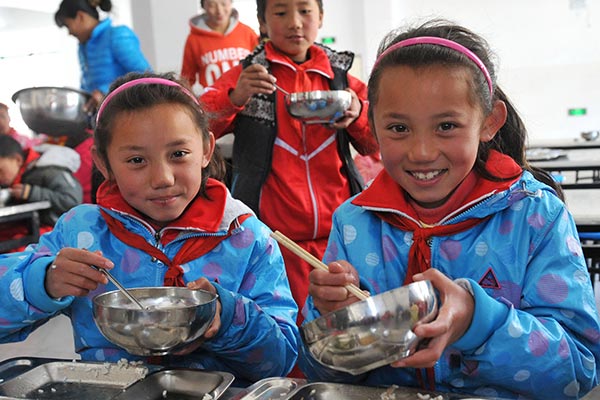
Sisters Tsering Yangzom and Tsering Droma enjoy a free lunch at their school in the Diqing Tibet autonomous prefecture in Yunnan province in March. Students in Diqing are given free accommodations at school and may receive subsidies.[Photo/Xinhua]
Investments to improve healthcare and teachers’ incomes in rural areas have paid off with measurable improvement in students’ development in underprivileged areas, but more measures are needed to achieve equality in education, according to the Ministry of Education.
To close the urban-rural gap in healthcare and education resources, the ministry pledged on Jan 30 to continue to carry out the National Development Plan for Children in Poverty-Stricken Areas (2014-20), investing more money and offering policy support to improve healthcare and nutrition along with the quality of education in the country’s central and western regions.
“The central government attaches great importance to the development of children in poverty-stricken areas, and the key is to allocate more resources in those regions to guarantee equal education and health services,” Lu Xin, deputy education minister, said at a State Council briefing about the plan on Jan 30.
The plan, which was worked out last year, is designed to serve children in 680 rural counties from birth to the completion of compulsory education.
Aiming to improve the overall development of underprivileged children to the national level by 2020, the plan details measures for better nutrition, school facilities and teachers.
China has invested a cumulative 47.2 billion yuan ($7.6 billion) since 2011 in student health, meals and construction of school canteens, helping 32.2 million students in 30 provinces, according to the ministry.
As proposed in the plan, the subsidy for nutritious meals for each student during compulsory education was raised from 3 yuan per day to 4 yuan.
“The effort has paid off. The health conditions of students in rural areas have improved, highlighted by an increase in average height and body weight as well as a decline in the anemia rate,” Lu said, citing the results of three years of monitoring the supplemental nutrition campaign.
To prevent misappropriation of funds, Lu said, the ministry and other departments are proposing a set of regulations and laws to be enacted to guarantee the safe and efficient use of money.
